![]()
NEEDS ANALYSIS
REVIEW |RESULTS | QUESTIONNAIRE | SHORT QUESTIONNAIRE
Germany| United Kingdom | Hungary | Finland
Results of the Needs Analysis Carried Out in Germany
A. Background Questions | B. Proficiency in German | C. Studying | D. Everyday Situations | E. Social life and leisure | F. Important Vocabulary
at Friedrich-Schiller-Universität Jena (spring 2000), Technische Universität Dresden (spring 2001), and Freie Universität Berlin (winter 2001-2002)
Total: 81 answers = 9 answers from FU Berlin, 62 answers from TU Dresden and 10 answers from FSU Jena
1. Gender Distribution
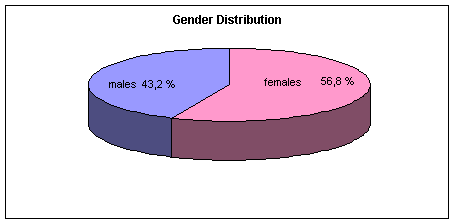
2. Age Distribution
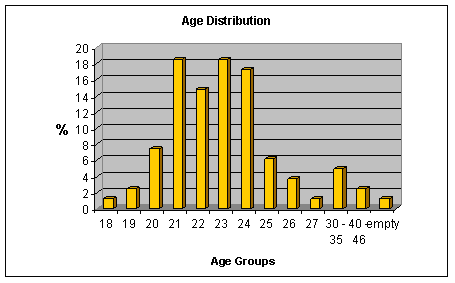
3. Home Country
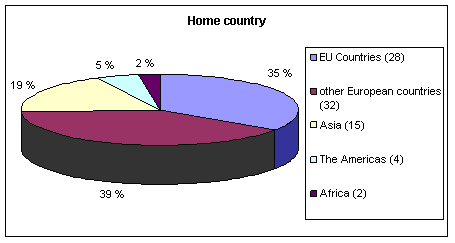
4.
Mother Tongues
Each of the following languages had only one speaker (1,2 %): Ashanti/Ewe/Joruba,
Bulgarian, Japanese, Catalan, Kirghiz, Greek, Rumanian, Serbo-Croatian,
Slovak, Danish, and Belorussian
(two students are bilingual, both languages have been counted separately)
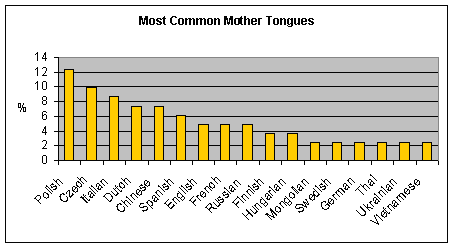
5. Other Languages (multiple answers, asked only in Dresden and Jena)
| fluent | good | satisfactory | very poor | |
| English | 16,7 % | 30,6 % | 25,0 % | 13,9 % |
| German | 33,3 % | 36,1 % | 11,1 % | 1,4 % |
| Russian | 2,8 % | 4,2 % | 12,5 % | 16,7 % |
| French | 4,2 % | 6,9 % | 15,3 % | |
| Spanish | 1,4 % | 1,4 % | 4,2 % |
|
| Czech | 1,4 % | 1,4 % | ||
| Arabian | 2,8 % | |||
| Georgian | 1,4 % | |||
| Rumanian | 1,4 % | |||
| Finnish | 1,4 % | |||
| Hungarian | 1,4 % | |||
| Dutch | 1,4 % | |||
| Croatian | 1,4 % | |||
| Norwegian | 1,4 % | |||
| Swedish | 1,4 % | |||
| Italian | 1,4 % | |||
| Polish | 1,4 % | |||
| Slovak | 1,4 % | |||
| Greek | 1,4 % |
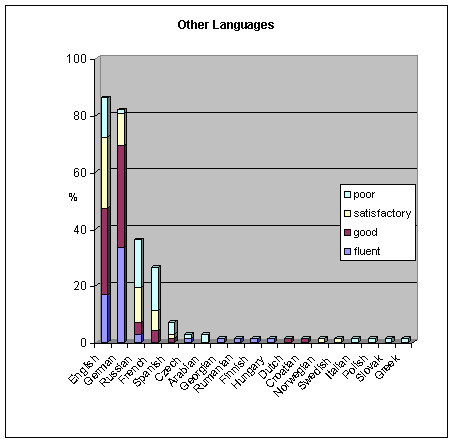
6.
Students’ Field of Study
(faculties/departments; FUB = Freie Universität Berlin, TUD = Technische
Universität Dresden, FSU Jena = Friedrich-Schiller-Universität
in Jena) (those students who study in two or three faculties/departments
are counted more than once)
Altogether 32,1 % of the students study Germanics or German as a foreign language, which means that it is clearly the most common field of study.
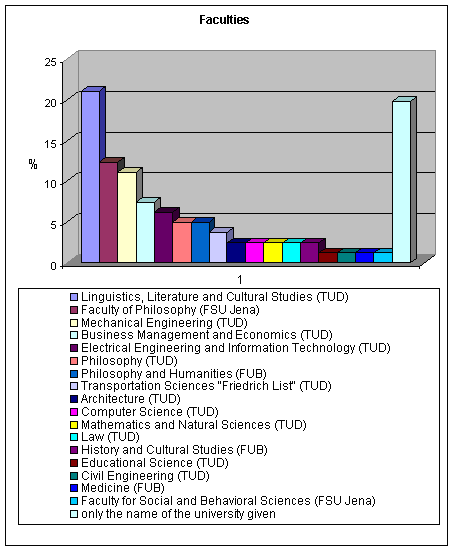
7. Length of Stay
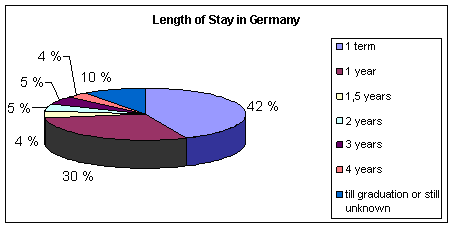
8. Why did you want to study abroad? (multiple answers, asked only in Dresden and Jena)
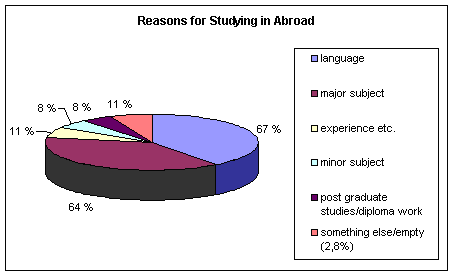
9. How (through which programme) did you come to Germany? (asked only in Dresden and Jena)
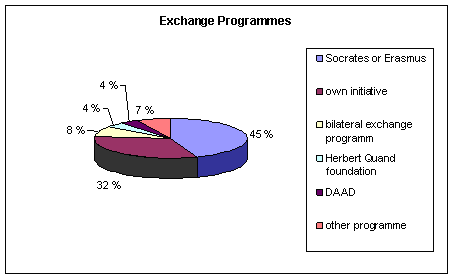
10. Reasons for Studying in Germany (multiple answers)

11. What has surprised you most about Germany? (multiple answers)
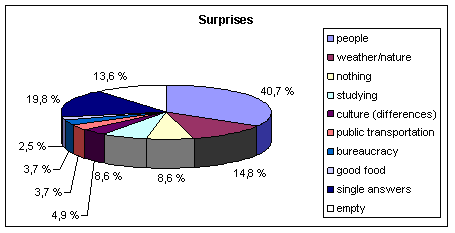
people 40,7 %
- “Die
Zurückgezogenheit der Leute”.
People are unsociable. (F23, Jena/Hungary) - “Deutsche
Pünktlichkeit.”
The German punctuality. (M22, Dresden/Kirghizia) - “Wie
freundlich und nett die Leute hier sind.”
How friendly and nice people are here. (M21, Dresden/The Netherlands) - “Ausländerfeindlichkeit.”
Hate of foreigners. (F21, Dresden/Serbia and Montenegro) - “Der
Individualismus.”
Individualism. (F30, Dresden/Colombia)
weather/nature 14,8 %
- “Man
kann überall grüne Natur sehen.”
You can see green nature everywhere. (F35, Dresden/China)
nothing 8,6 %
- “Nichts.”
Nothing. (M22, Jena/USA)
studying 8,6 %
- “Es
wird unglaublich viel für Studenten gemacht. Bibliothek, Mensa,
Wohnheim (Waschmaschine). Im Seminar können alle Studenten Kopien
kriegen. Zu Hause kriegen wie nur 1 Kopie pro Gruppe
They take amazingly good care of students. Library, refectory, dormitory (washing maschine). All the students are able to get hand outs in seminars. We get only one hand out for a group (19 people) at home. (F20, Jena/Belarus) - “Dass
man echt wählen kann, was man studieren will; dass es viele spezifische
Seminaren gibt.“
That you can really select what you want to study; that there are so many specific courses. (F21, Berlin/Spain)
culture (differences) 4,9 %
- “Die
anderen Traditionen.”
Other traditions. (F20, Jena/Italy)
public transportation 3,7 %
- “Die
Verkehrsmittel. Sie sind wirklich pünktlich.”
The means of transportation (public transportation). They are really punctual. (F22, Berlin/Italy)
bureaucracy 3,7 %
- “Dass
es hier so viel Bürokratie gibt!”
That there is so much bureaucracy! (F22, Jena/Denmark)
good food 2,5 %
single answers 19,8 %
- “Dass
die Frauen mit Rock Fahrrad fahren!”
That women cycle a skirt on! (M21, Dresden/Mongolia) - “An
erster Stelle die sächsische Sprache…Gomisch!”
First of all the Saxon language…Weird! (F21, Dresden/Rumania) - “Die
Sauberkeit.”
The cleanness. (F24, Dresden/Thailand)
empty 13,6 %
12. What have you enjoyed most about Germany? (multiple answers)
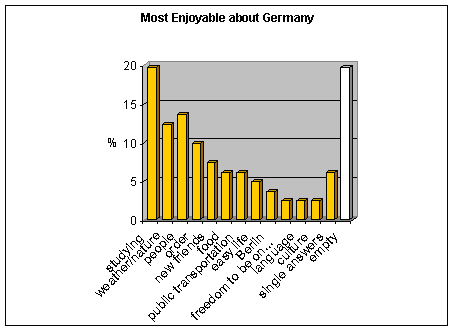
studying 19,8 %
- “Der
Student hat sehr guten Zugriff auf Materialen, Laboratorien, Hilfe.”
The student has a very good access to materials, laboratories and help. (M22, Dersden/Poland) - “Die
Art und Weise der Kurse.”
The way courses are organised. (M26, Dresden/Italy) - “Die
Freiheit des Studenten.”
Student’s freedom. (M23, Dresden/Czech Republic) - “Nur
25 Leute in jede Vorlesung!”
Only 25 people in each lecture! (F22, Berlin/Spain) - “Im
Studium kann man selbstständig sein, seine Kurse selbst wählen
und in der Freizeit gibt es viele Aktivitäten, die Berlin oder
die Uni bietet.”
You can be independent with your studies, you can choose your own courses, and there are a lot of activities offered by the city of Berlin or the university for leisure time. (F20, Berlin/Finland)
weather/nature 12,3 %
- “Das
Klima ist am besten.”
The weather is the best. (M32, Dresden/China)
people 13,6 %
- “Die
Leute sind sehr hilfsbereit und freundlich.”
People are very helpful and friendly. (F19, Dresden/The Netherlands) - “Diese
Vielfalt der Leute, weil man verschiedene Kulturen kennen lernen kann.”
These diversity of people, because you can get to know different cultures. (F22, Berlin/Italy)
order 9,9 %
- “Pünktlichkeit
(Deutsche Bahn ausgeschlossen!).”
Punctuality (except Deutsche Bahn [German Railways]) (M21, Dresden/Mongolia) - “Alles
wird gut organisiert. Man fühlt sich sicher hier.”
Everything is well organised. You can feel safe here. (M21, Dresden/Russia)
new friends 7,4 %
food 6,2 %
- “Bier
schmeckt sehr gut.”
Beer tastes very good. (M24, Dresden/Finland) - “Döner.”
Kebab. (M21, Dresden/The Netherlands)
public transportation 6,2 %
- “Die
Schnelligkeit und die Wirksamkeit der Verkehrsbetriebe. “
The efficiency of the public transportation. (F21, Berlin/Spain)
easy life 4,9 %
- “Ein
angenehmes Leben, ohne Stress.”
Comfortable life without stress. (M21, Berlin/France) - “Ich
fühle mich hier sicher, ruhig, habe nicht so viel Stress an der
Uni. Ich muss hier nicht so viele Prüfungen ablegen. Ich bin unabhängig.”
I feel safe and peaceful here, I don’t have so much stress at university. I don’t have to take so many exams here. I am independent. (F20, Jena/Belarus)
Berlin 3,7 %
- “Ich
mag alles von Berlin. Die Stadt ist so groß und es gibt so viele
Dinge zu sehen. Vielleicht sind 10 Monate nicht genug, alles zu sehen!“
I like everything about Berlin. The city is so big and there are so many places to see. Perhaps 10 months are not enough for seeing everything! (F22, Berlin/Italy)
freedom to be oneself 2,5 %
- “An
Berlin ist es die Freiheit so zu sein wie man ist, es gibt viele Möglichkeiten
sich in die Richtung zu entwickeln, die einem gefällt.”
[The most enjoyable] about Berlin is the freedom to be yourself. The city offers you many opportunities for improving yourself in the direction you like. (F20, Berlin/Finland)
language 2,5 %
- “In
einer Fremdsprache zu reden.”
To speak a foreign language. (M21, Jena/USA)
culture (not specified) 2,5 %
single answers 6,2 %
- “Dass
man Heimweh empfinden kann.”
That you can be homesick. (M26, Dresden/Rumania) - “Wenn
ich warmes Wasser will, kommt das sofort, ich muss nicht warten! Die
Post ist schnell.”
When I want to have warm water, I don’t have to wait since it comes immediately! The post is fast. (F22, Berlin/Spain)
empty 19,8 %
13. What have you enjoyed least about Germany? (multiple answers)
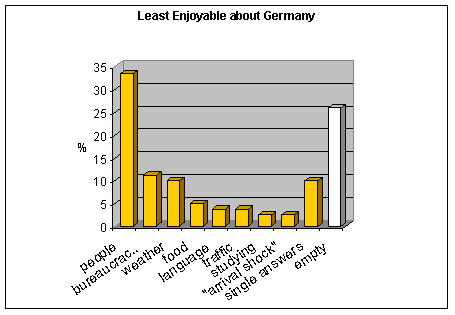
people 33,3 %
- “Die
Unfreundlichkeit und die übertriebene Effizienz. Dabei sind die
Menschen, die dich auf der Straße anschreien, einfach nicht glücklich
und scheinen nicht soviel zu schaffen.“
Unfriendliness and exaggerated efficiency - the people who shout at you in the street don’t look happy and also not very effective. (F19, Berlin/Finland) - “Die
Ausländerfeindlichkeit.”
Hate of foreigners. (M21, Jena/USA) - “Das
Verhalten meiner Mitbewohnerin (aus Deutschland).”
My flat mate’s (German) behaviour. (F23, Dresden/Czech Republic)
bureaucracy, bad service 11,1 %
- “Bürokratie
in Behörden/Ämtern.”
Bureaucracy by public authorities/in offices. (F25, Jena/Poland) - “Die
schrecklichen Beamten.”
The awful civil servants. (M23, Dresden/Czech Republic)
weather 9,9 %
- “Das
Wetter, man hat keine Lust aufzustehen, etwas zu machen…!”
The weather, you don’t want to wake up and do something…! (F24, Berlin/Italy) - “Es
wird dunkel zu früh und es ist zu kalt.
It gets dark to early and it is too cold. (F21, Berlin/Spain)
food 4,9 %
- “Kartoffeln.”
Potatoes. (F24, Dresden/Thailand)
language 3,7 %
- “Der
sächsische Dialekt.”
The Saxon dialect. (M23, Dresden/France)
traffic 3,7 %
- “Zu
viele Autos und alles was dazu gehört.”
There are too many cars and everything. (M21, Dresden/Russia)
studying 2,5 %
- “Studien
im Sommer (Juli und August).
Studying in summer (July and August). (M24, Dresden/Poland)
"arrival shock" 2,5 %
- “Mein
Zimmer . erster Augenblick.”
My room, the first glance [at it]. (F23, Dresden/Poland)
single answers 9,9 %
- ”Sich
fremd zu fühlen.”
To feel a stranger. (M21, Berlin/France) - “Alles
im Aufbau (Baustellen).”
There are building sites everywhere. (M23, Dresden/The Netherlands) - “Es
ist in Berlin, wie in allen anderen goßen Städten, zu teuer
auszugehen.”
It is too expensive to go out in Berlin, just like in all the other big cities. (F21, Berlin/Spain)
empty 25,9 %
14. Did you take part in the orientation week programme? Some of the students, who didn’t take part in the orientation week programme, didn’t even know that there’s an orientation week. Those who knew and took part in it were satisfied with the information they got. (asked only in Dresden and Jena)
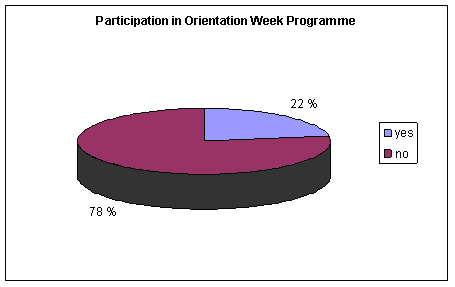
15. More Information Needed on (multiple answers, asked only in Dresden and Jena)
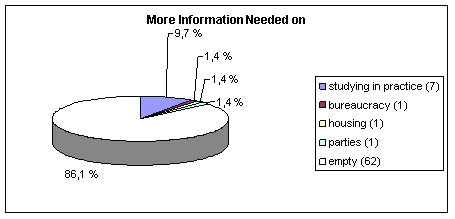
16. Have you had any difficulties in dealing with practical matters or getting to know the university? (asked only in Dresden and Jena)
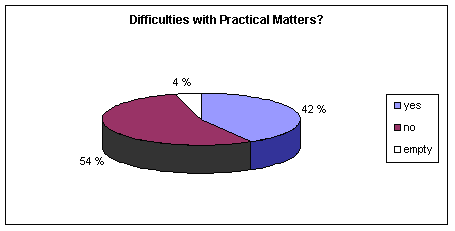
17. More specified answers (when yes: 30 answers) (multiple answers, asked only in Dresden and Jena)
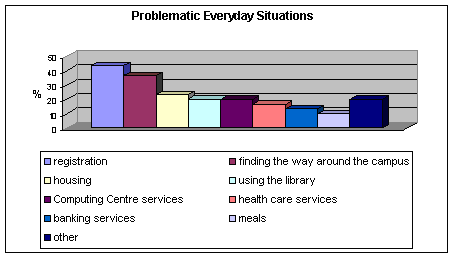
A. Background Questions | B. Proficiency in German | C. Studying | D. Everyday Situations | E. Social life and leisure | F. Important Vocabulary